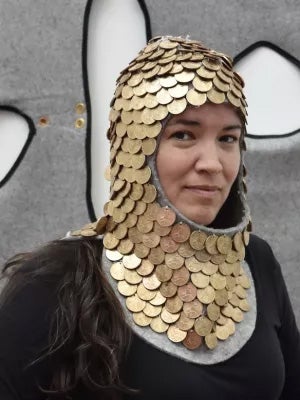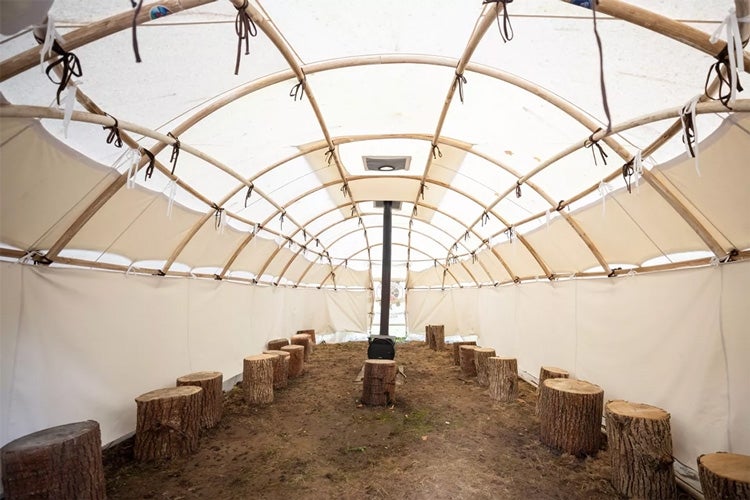This winter, students taking Maria Hupfield's " Indigenous Feminisms " course won't meet in a classroom or lecture hall, but will head to the northern edge of the University of Toronto Mississauga campus where, nestled in a quiet spot among trees, sits the Indigenous teaching lodge.
Inaugurated in September 2023 , the lodge has hosted workshops, conferences and occasional classes - but this marks the first time a course will predominantly be held in the space.

For Hupfield, an assistant professor in U of T Mississauga's department of English and drama who is cross-appointed to the department of visual studies, the walk to the lodge will be just as integral to students' learning as the conversations that will take place beneath its canopy.
"This small journey will start the process of moving students away from their usual way of thinking," says Hupfield, who holds a Canada Research Chair in Transdisciplinary Indigenous Arts. "Then, once they get into the lodge, it defamiliarizes them because they're not in the usual lecture hall or seminar room. It opens up how they respond to the teaching and how they approach the content."
A third-year English course, "Indigenous Feminisms" will rely on traditional and modern Indigenous texts, media and performances. Classes will be held in the teaching lodge - which has a wood stove - whenever possible, moving to the Multimedia Studio Theatre only when advanced digital technology is needed.
Leading a course in an Indigenous space marks the latest chapter in a longstanding connection between Hupfield, an off-reservation urban Anishinaabe who belongs to the Wasauksing First Nation, and U of T Mississauga.
An alumna of the university, Hupfield earned a degree in art and art history with a minor in Aboriginal studies - somewhat unusual in the late 1990s. "I became very interested in working at the intersection of Anishinaabe cultural knowledge and Western-based art practices," she says. "The program made room for me to do that."
As a student, Hupfield mounted her own exhibits and launched partnerships with Indigenous arts and social services organizations. After graduating, she went on to establish herself as an internationally respected artist, holding exhibitions at prominent galleries across North America and winning prestigious awards.
In 2019, she returned to U of T Mississauga as a faculty member, and amid increased institutional support for Indigenous initiatives, has thrived and expanded the scope of her projects.
As director and lead artist at the new Indigenous Creation Studio , Hupfield leads a team of faculty members and students exploring media ranging from traditional sculpture to video. Her current research, conducted in collaboration with Indigenous communities, aims to bring new life to Indigenous artefacts via the creation of a digital archive that presents each piece in novel ways, such as through storytelling, video and 3D rendering.
She also leads a seminar series for students in the master of visual studies program at the John H. Daniels Faculty of Architecture, Landscape, and Design.
Hupfield also continues to work on an array of projects beyond campus. Earlier this year, she contributed to the first ever Native Fashion Week held in Santa Fe, New Mexico. She is also currently presenting an original commission at the Toronto Biennial of Art , an opportunity she describes as "a really powerful moment in my art practice."

As she looks forward to the "Indigenous Feminisms" course, Hupfield reiterates that Indigenous pedagogy is about doing and experiencing. "I find that it's not until students are outside on the land and in Indigenous spaces that they really understand the teachings," she says.
Tee Duke, director of U of T Mississauga's Office of Indigenous Initiatives, notes that expansion of Indigenous curriculum and spaces - along with hiring of Indigenous faculty - were among the calls to action outlined in Answering the Call - Wecheehetowin , the final report of the U of T Truth and Reconciliation Commission Steering Committee. "It's an important development to have a course on Indigenous Feminisms taught in UTM's own teaching lodge," Duke said.
The course also ties into U of T Mississauga's strategic framework , specifically the central values of truth, openness and reciprocity, according to Terry F. Robinson, associate chair of the department of English and drama. "We're thrilled to be able to offer this experiential, land-based course, led by inter-disciplinary scholar Professor Hupfield," Robinson said.
Registration for the course is already full - a fact that is incredibly heartening for Hupfield.
"I love that there's interest. It's beautiful," she says. "More courses like this, held in Indigenous spaces and rooted in experiential learning, will attract more Indigenous students. We need to continue to support Indigenous research and teaching, and focus on retaining Indigenous faculty.
"But so much is happening here right now and I'm happy to be part of it."






